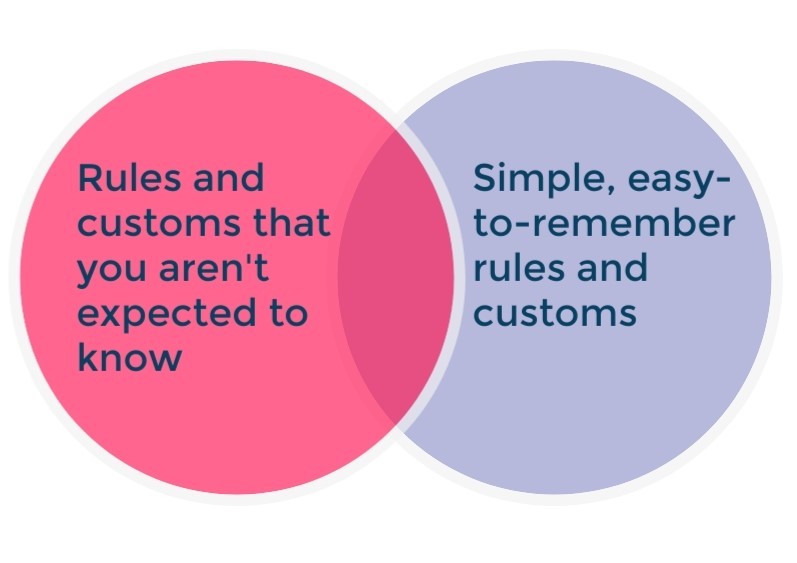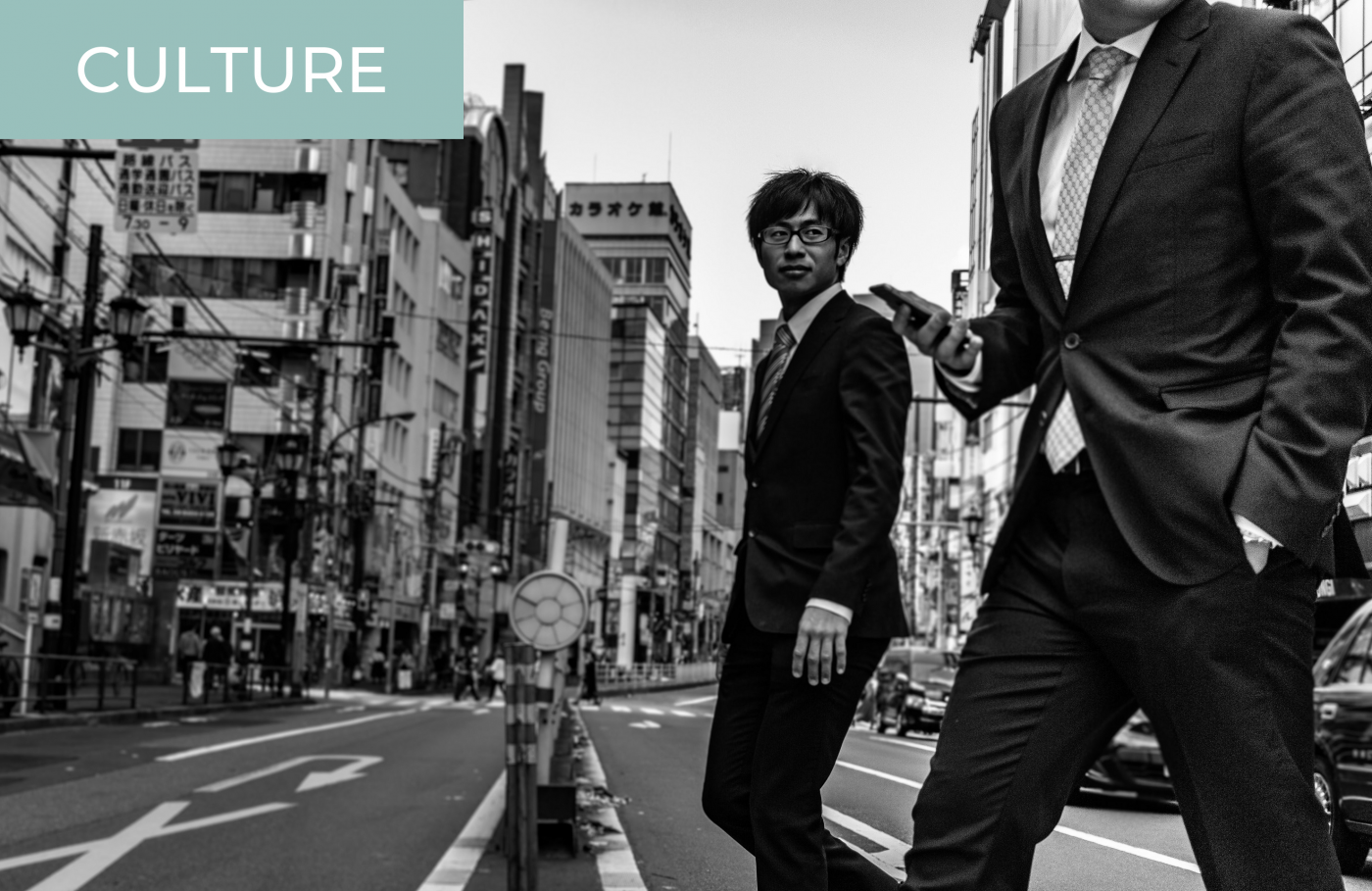Learning all of the intricate rules that shape business conduct in Japan could take a lifetime. This is evidenced by the intimidating amounts of content available on this topic. It’s enough to make you throw in the towel and give up your dreams of working or starting a business in Japan.
I’m here to tell you to hold on to those dreams. Despite the overwhelming amount of rules and cultural norms, you’ll find that your Japanese professional counterparts will take context into account—the fact that you weren’t born and raised in this system. You aren’t expected to be perfect.
Now, this isn’t a license to wear a hoodie and tennis shoes to your next meeting. What I do want to emphasize is that knowing some practical business basics can go a long way toward making a good impression.
The Sweet Spot for Success

When considering your approach to Japanese business manners, imagine a Venn diagram with two overlapping circles: obscurity and simplicity. The spot where obscurity overlaps with simplicity is your sweet spot for success. What follows are a few simple actions (and links for more details) that have helped me throughout my career in Japan, first as an employee for a Japanese company and now as a sole proprietor.
1. Never Be Without Business Cards
By now, I’m sure you’ve seen all of the articles about the proper way to exchange business cards in Japan (if you haven’t, here’s a beyond thorough guide). Unfortunately, a lot of articles and guides out there fail to underscore how important it is to have business cards in the first place. Even if you are traveling as a tourist, you should still be prepared for unexpected business and networking opportunities to arise.
I’ll occasionally encounter American business travelers without business cards, opting to connect on the spot via LinkedIn instead. As an avid LinkedIn user, this works wonders for me, but unfortunately, LinkedIn is not widely used in Japan. If you don’t have a business card to present to a Japanese counterpart, you might as well not exist.
You may be able to pull off a quick save by connecting via Facebook (which is used for both business and personal social networking here), but business cards are still the only real way that professionals keep track of their business connections (especially if you are dealing with tradition-minded senior executives).
So, don’t take it lightly if you forget to pack your business cards on your next trip. Have some made as soon as you touch down in Japan—even if they’re off brand, for temporary use. If you’re in Tokyo, you can rely on shops such as Grap, or K-1 Print to make you a fresh set of cards that will be ready on the same day that you order them.
2. Learn and Use as Much Polite Japanese as Possible
Even if you don’t speak Japanese fluently, a few simple adjustments to the common words that you do know can go a long way toward making a good impression.
For a basic example, let’s look at the phrase “thank you.” Anyone can say a casual “arigato.” In business situations, however, make an effort to be more formal by saying “arigato gozaimasu.” Demonstrating politeness with a few well-pronounced key words shows that you are making an effort to be respectful.
Another extremely useful, formality-packed phrase to master is “yoroshiku onegaishimasu.” Depending on when and how the phrase is used, it can be a polite way to express anything from “It’s a pleasure to meet you” to “I’m looking forward to working with you.”
If you do speak Japanese, learn to use as much keigo (honorific Japanese) as possible. As a foreigner, you won’t be expected to maintain a perfect keigo conversation for hours on end, but a little keigo goes a long way toward making a memorable first impression.
For more on polite and formal Japanese, check out this primer by Coto Japanese Academy.
You may also be interested in another one of my articles: “How Much Japanese Do You Need to Know to Work or Do Business in Japan?“
3. Know Basic Seating Etiquette
As you can see here, from taxi cab rides to late-night drinks at an izakaya, knowing where to sit during a business engagement is no simple matter. If some of the more complex seating rules slip your mind, just be sure to remember that customers and higher-ups should always be offered the “kamiza,” the seat of honor.
The kamiza is typically the innermost seat that faces the exit of a meeting room, waiting room, or private restaurant booth. It is said that this tradition dates back to feudal times when the kamiza was the warmest and safest spot in a room. Seating an important figure in this position protected them from surprise attacks from behind. Thankfully, surprise attacks are a thing of the past, but the tradition of positioning important people in strategic positions continues to this day. This is a custom that your Japanese clients or superiors won’t necessarily expect you to know, so demonstrating your knowledge of this and making the gesture proactively will surely impress.
4. Remember That Silence Actually Is Golden
As an American, I’ve spent the majority of my life in a culture that labels lulls in conversation as awkward. Therefore, life in Japan is a constant battle to quell the urge to fill the void of silence in a long elevator ride or interrupt the extended pauses that punctuate statements in Japanese meetings.
In a business culture that revolves around consensus-building, the ability to listen is paramount. Brush up on your active listening skills and boost your emotional intelligence to avoid boardroom blunders.
5. Consult Your Colleagues

I’m saving the most important rule for last. Approach your business interactions with a Beginner’s Mind, and don’t hesitate to ask your Japanese colleagues, managers, or contacts about how you should present yourself and what you should say and do.
This may seem obvious, but we all have a level of pride, especially if we have substantial business experience. It can be humbling to ask about basic topics such as how to sit and what to say, but like it or not, impressions are critical in Japan and any good colleague should appreciate your eagerness to learn.
And, when all else fails, do as the locals do and read the room. In a meeting or important social engagement, delay your words and actions for a moment, watch what everyone else is doing, and then follow suit. No one is going to criticize you for being too slow or observant.
Be Confident And Keep Learning

Without a doubt, the complex web of Japanese rules and manners is intimidating. However, you’ll find that a few common-sense guidelines will go a long way toward your success. Study up on business etiquette, be observant, and conduct yourself with patience and humility.
With this attitude, the tips above, and a willingness to learn more as you go, you won’t have to fear working or conducting business in Japan.




